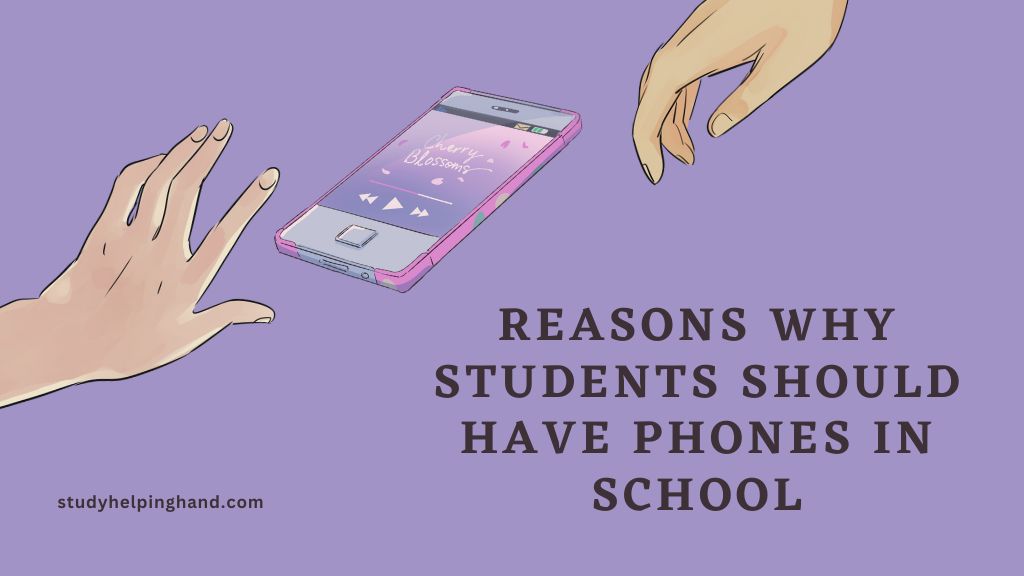With the rise of technological advancements, smartphones have become a must-have gadget these days. While they were initially meant for communication purposes, they have evolved over time to serve multiple functions such as entertainment, education, and work. In the past, schools frowned upon students who brought phones to school, considering them to be unnecessary distractions. However, with changing times, there has been a shift in this mindset, and now, many schools are advocating the use of phones in schools. In this article, we will look at 22 reasons why students should have phones in school.
22 reasons why students should have phones in school
1. Emergency contacts are always accessible
Smartphones are a reliable tool when it comes to emergency situations. In case of a crisis, students can easily use their phones to contact parents or emergency response teams. Keeping phones in school ensures that students can quickly access their emergency contacts if ever the need arises.
2. Students can stay connected with their parents
Having a phone ensures that students can stay in touch with their parents throughout the day. Parents can check in with their children to see how they are doing, and students can send a quick text message or call in case they need any help.
3. Schedule management is easier
Many students have busy schedules, with activities before and after school. Having a phone makes it easier for them to keep track of their timetable and schedule appointments or activities.
4. An important tool for research
Smartphones are equipped with an internet connection, which is an essential tool for research purposes. Students can use their phones to access the internet and gather information for assignments or class projects.
5. Enhances classroom communication
Classroom communication is crucial, and having a phone can enhance it. Students can quickly connect with their peers and teachers to ask for help or clarification.
| Also read: How to succeed in homework |
6. Emergency alerts
Phones can receive emergency alerts and updates from school administrators or emergency response teams. These alerts help students stay informed about any necessary changes or precautions that they may need to take.
7. Easy access to textbooks
Many schools are incorporating digital textbooks into their curriculum. Having a phone makes it easier for students to access these textbooks, and they can reference them whenever needed.
8. Digital organisation
Gone are the days when paper planners or diaries were necessary for organisation. Smartphones have various digital organisers, making it easier for students to plan and manage their schedules.
9. Can act as a calculator
Smartphones come equipped with a calculator, saving students from the hassle of carrying one around. This feature comes in handy during maths or science classes.
10. Keeps students entertained during breaks
During breaks or lunch, students can use their phones to stay entertained. Whether it be reading an eBook or watching a video, phones can provide a much-needed break from studies.
11. Access to educational apps
There are numerous educational apps available that can help students learn beyond the classroom. For instance, apps like Duolingo can help students learn a new language, complementing their language studies.
| Also read: How To Recognise Good and Bad Stress |
12. Acts as a reminder
Students can use their phones to set reminders, ensuring that they don’t forget important assignments or deadlines.
13. Helps improve vocabulary
Students can download various vocabulary apps that help them improve their language skills. Apps like Vocabulary.com offer quizzes and games that make learning fun and engaging.
14. Improves reading skills
Reading apps like Kindle or iBooks can help students improve their reading skills. They offer various features like highlighting and bookmarking that make reading more convenient.
15. Provides an alternative learning experience
With access to educational apps and eBooks, students can explore various topics beyond the classroom. This alternative learning experience can be enriching and broaden their knowledge.
16. Enables easy note-taking
Students can use their phones to take notes during lectures or discussions. This feature is especially convenient as they don’t have to carry around bulky notepads.
17. Helps improve writing skills
Writing apps like Grammarly can help students improve their writing skills. These apps offer suggestions for grammatical errors and improve students’ overall writing style.
18. Assists in language translation
Language translation apps can help students communicate with their peers who speak different languages. They can easily translate phrases and sentences, making communication more accessible.
19. Students can capture lectures
With the camera feature on their phones, students can record lectures for future reference. This feature is especially useful for students who miss classes or need to review a lecture after class.
20. Provides easy access to news updates
Students can stay informed about the latest news and events by using their phones. This feature helps improve their general knowledge and can complement class discussions.
21. Bridges communication gaps
Students who struggle with communication can use their phones to connect with their peers and teachers. This feature can help them build social connections and feel more included.
22. Practical life skills
Using a phone enhances practical life skills, such as time management, organisation, and communication. These skills are essential for a student’s success in their academic and professional lives.
Conclusion
In conclusion, having phones in school has many advantages, as seen from the points mentioned above. The education sector can benefit from incorporating phones as an essential tool for academic success. Not only do phones provide access to information and communication, but they can also improve students’ organisation and practical life skills.


